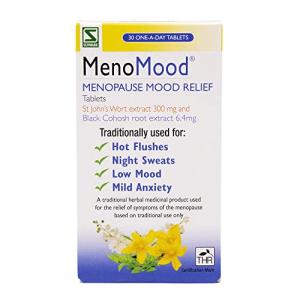The Emotional Side of Menopause
When I first began treating women in perimenopause, I assumed hot flushes would be the symptom that caused the most distress. I quickly learnt otherwise. For many women, it’s the emotional side of menopause that feels hardest to bear.
Anxiety that appears out of nowhere, sudden irritability, or mood swings that feel out of character — these can be unsettling. Patients often say to me, “I don’t feel like myself anymore.”
The good news is that you are not imagining it, and you are not alone. Hormonal changes genuinely affect the brain’s chemistry. With the proper support, natural remedies, and small lifestyle shifts, balance is possible again.
Why Mood Changes Happen
Falling levels of oestrogen and progesterone affect neurotransmitters like serotonin and GABA, which regulate mood and calmness. Additionally, poor sleep due to night sweats or hot flashes can exacerbate irritability. It’s a perfect storm.
Stress levels may rise, and some women are more vulnerable to anxiety or even depression during perimenopause. Knowing the cause is the first step toward managing it.
CanesMeno Menopause Support with Red Clover & Vitamins
Feel balanced and energized with this all-in-one support formula designed for menopause relief
Product information
$36.13 $21.26
Product Review Score
4.36 out of 5 stars
87 reviewsProduct links
Sarah’s “Out of Nowhere” Anxiety
Sarah, 47, came to see me because she suddenly found herself overwhelmed by panic before meetings. She had never experienced anxiety in her life, yet now even small things left her breathless and shaky.
Together, we worked on practical steps: daily walks, magnesium supplementation, and short breathing exercises before bed. Within two months, she told me she no longer dreaded her workdays. “I feel like I’m back in my own skin,” she said.
Natural Remedies for Menopause Anxiety and Mood Swings
1. Exercise for Calm and Clarity
Movement isn’t just good for the body; it stabilises mood. Aerobic activity like brisk walking or cycling boosts serotonin, while yoga and Pilates encourage relaxation. Even ten minutes a day helps.
2. Herbal and Nutritional Support
- Magnesium: Known as nature’s relaxant, it can calm the nervous system.
- Ashwagandha: An adaptogen herb often used to reduce stress responses.
- Omega-3 fatty acids: Support brain health and emotional resilience.
3. Mindfulness and Breathing Techniques
Simple breathing exercises lower cortisol and reduce the “fight or flight” response. Apps for guided meditation can be a practical starting point.
4. Sleep Hygiene
Insomnia makes anxiety worse. Cooling bedding, herbal teas, and a set bedtime routine can make an enormous difference. (Internal link: “cooling bedding” → Sleep & Insomnia Support)
5. Talking Therapies
Counselling or CBT (cognitive behavioural therapy) gives many women practical tools to manage anxious thoughts and mood shifts.
Menopause Meets Supermarket Queues
One patient laughed as she told me she burst into tears at a self-checkout machine because it said “unexpected item in bagging area”. Menopause mood swings can strike anywhere, even Tesco. The important thing is to learn to recognise the triggers and not blame yourself.
MenoMood Mood Relief with St. John's Wort
Feel better every day with this natural blend designed to lift your spirits and ease mood swings
Product information
$22.74
Product Review Score
4.17 out of 5 stars
83 reviewsProduct links
Angela’s Short Fuse
Angela, 51, described herself as a “ticking time bomb”. Little things at home — her teenager’s messy room, her husband leaving mugs around, suddenly made her snap.
She introduced daily breathing exercises, swapped coffee for herbal tea, and tried a sage supplement recommended by a friend. “I still get irritated,” she admitted with a laugh, “but at least I don’t feel like throwing mugs out the window anymore.”
Managing Stress in Perimenopause
Perimenopause often coincides with life stress: teenagers, ageing parents, busy careers. These external pressures, combined with hormonal shifts, leave women feeling overwhelmed.
Practical stress management can include:
- Saying no more often
- Scheduling rest time as non-negotiable
- Connecting with supportive friends or groups
When to Seek Professional Help
If anxiety or low mood is overwhelming, persistent, or linked with loss of interest in life, it’s essential to speak with a doctor. Treatments such as hormone replacement therapy (HRT) or antidepressants may be appropriate and can work alongside natural remedies.
Helpful Products and Tools to Explore
- Magnesium and ashwagandha supplements
- Herbal teas (chamomile, lemon balm, passionflower)
- Mindfulness apps or guided meditation recordings
- Weighted blankets for calming the nervous system
- Aromatherapy oils such as lavender
Balance Is Possible
Menopause may stir up unexpected emotions, but you are not powerless. By combining natural remedies, lifestyle adjustments, and, when needed, professional help, it’s possible to find stability again.
Above all, remember that mood swings and anxiety are not signs of weakness. They are a biological response to hormonal change. With the proper support, you can feel more like yourself and embrace this stage of life with confidence.




